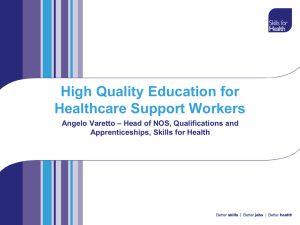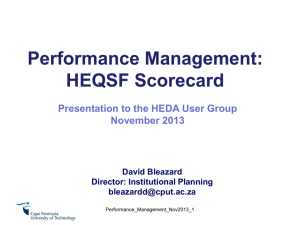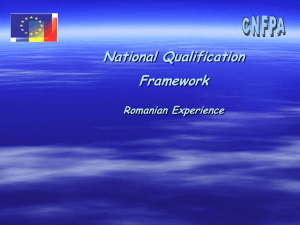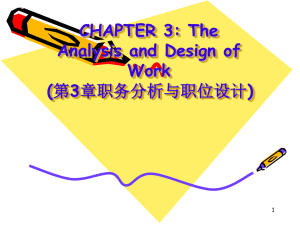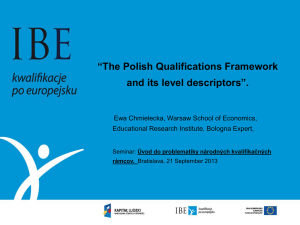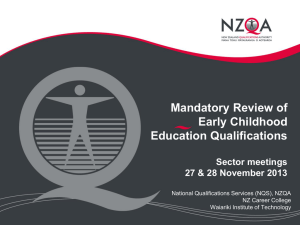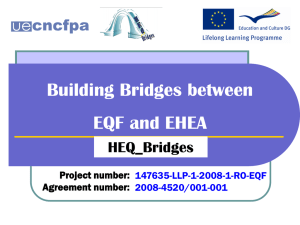National Framework for Higher Education Qualifications in Republic
advertisement
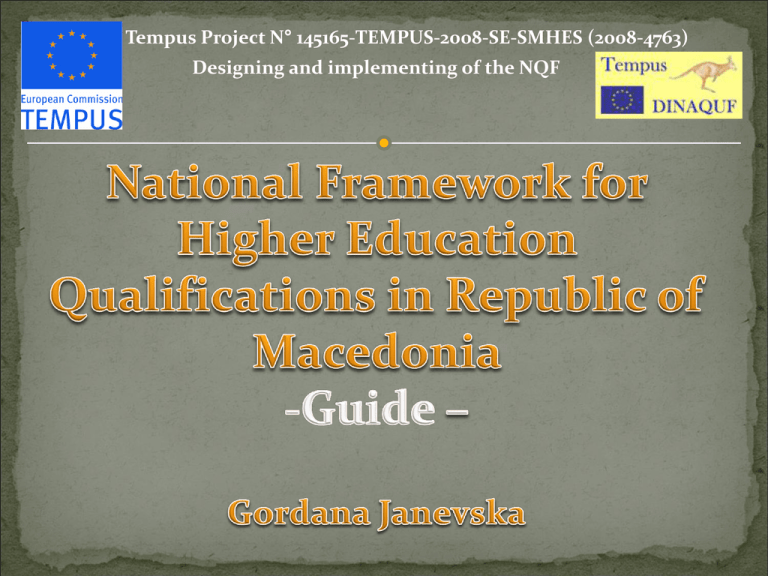
Tempus Project N° 145165-TEMPUS-2008-SE-SMHES (2008-4763) Designing and implementing of the NQF GLOSSARY Appendix 1: Shared Dublin descriptors for short cycle, first cycle, second cycle and third cycle awards Appendix 2: Decree for the National Framework for Higher Education Qualifications (“Official Gazette” No. 154 from 30/11/2010) Appendix 3: Schematic comparison between Macedonian and Dublin Descriptors Appendix 4: 10 steps in developing a national qualifications framework Appendix 5: Criteria & Procedures for Verification of Framework Compatibility (Extract from Working Group on Qualifications Frameworks Report, 2005) RATIONALE AND PURPOSE OF THE FQ – EHEA BASIC ELEMENTS OF FQ – EHEA Cycles and levels Descriptors of learning outcomes, including competences Credit and workload Profile NATIONAL FRAMEWORK FOR HIGHER EDUCATION QUALIFICATIONS IN REPUBLIC OF MACEDONIA (NF-HEQ IN RM ) BASELINE FOR NQF METHODOLOGY USED FOR DESIGNING AND IMPLEMENTING (NF-HEQ IN RM) POSITIONING QUALIFICATIONS WITHIN NF-HEQ IN R. MACEDONIA QUALIFICATION DESCRIPTORS ALIGNING NF FOR HEQ WITH FQ FOR EHEA NATIONAL FRAMEWORK FOR HIGHER EDUCATION QUALIFICATIONS IN REPUBLIC OF MACEDONIA (NF-HEQ IN RM ) BASELINE FOR NQF New Law on Higher Education ("Official Gazette" No. 35/08) Low on adult education ("Official Gazette" No. 7/08) Low on Vocational Education and Training ("Official Gazette" No. 71/06) METHODOLOGY USED FOR DESIGNING AND IMPLEMENTING (NF-HEQ IN RM) Decision to start Design Profile Setting the agenda Consultation National discussion and acceptance Organizing the process of design by stakeholders Approval According to national tradition Administrative set-up Division of tasks of implementation between HEI, QAA and other bodies Implementation at institutional/programme level Inclusion of qualifications in the NQF Self-certification of compatibility with the EHEA framework NATIONAL FRAMEWORK FOR HIGHER EDUCATION QUALIFICATIONS IN REPUBLIC OF MACEDONIA (NF-HEQ IN RM ) POSITIONING QUALIFICATIONS WITHIN NF-HEQ IN R. MACEDONIA NATIONAL FRAMEWORK FOR HIGHER EDUCATION QUALIFICATIONS IN REPUBLIC OF MACEDONIA (NF-HEQ IN RM ) QUALIFICATION DESCRIPTORS The description of learning outcomes for a given level of qualification is expressed with the following descriptors of qualifications (The Decree, Article 6): knowledge and understanding applying knowledge and understanding making judgment communications skills, and learning skills Descriptor for a higher education qualification at level 5: Short cycle Descriptor for a higher education qualification at level 6: Bachelor′s degree Descriptor for a higher education qualification at level 7: Master′s degree Descriptor for a higher education qualification at level 8: Doctoral degree NATIONAL FRAMEWORK FOR HIGHER EDUCATION QUALIFICATIONS IN REPUBLIC OF MACEDONIA (NF-HEQ IN RM ) ALIGNING NF FOR HEQ WITH FQ FOR EHEA Quality assurance and national frameworks of qualifications within the context of the EHEA Criteria and procedures for verifying the compatibility of frameworks with the framework for qualifications of the EHEA According to the Article 12 of the Decree, Each qualification in the National Framework should be compatible with the related qualification from the European Framework for Higher Education Qualifications. The procedure of verifying the compatibility of the National Framework with the European Framework for Higher Education Qualifications is carried out at least every five years. CONCLUSION AND FUTURE ASPECTS IN IMPLEMENTATION OF THE NF-HEQ The extract from Qualifications Frameworks Working Group Report, 2007, which presents the most important recommendations to be considered by countries in undertaking the verification process is given . According to Article 14, the HE institutions should prepare specific descriptors of the qualifications, which determine learning outcomes for the individual study program from the corresponding cycle of studies, submit them to the Ministry of Higher Education, as well as publish them on the websites. The implementation of the activities foreseen in Article 14, should start after six months from the date of adoption of the Decree. (Article 15) The strength of European higher education is the cultural richness and diversity, as represented by the 46 participating countries in the Bologna Process. The Bologna Framework and the development and implementation of national frameworks of qualifications are central to removing the barriers to mobility and the creation of a common language for qualifications.


